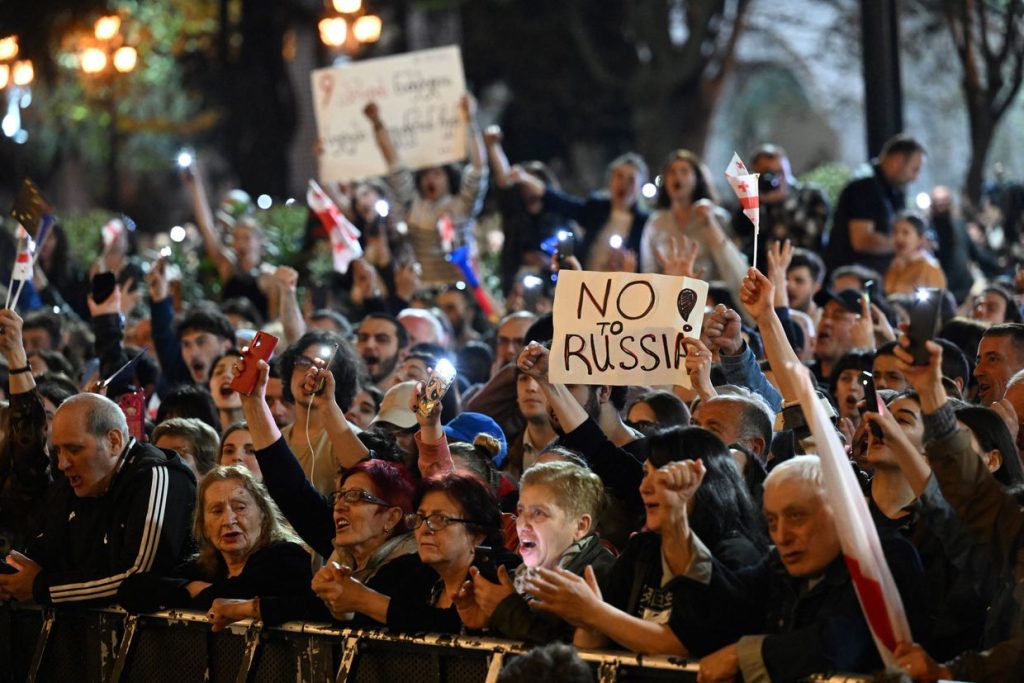In Georgia, President Salome Zourabichvili vetoed a controversial “foreign agents” bill that had been passed by parliament. The bill requires organizations receiving foreign funding to be labeled as “foreign agents,” similar to Russian legislation used to suppress Kremlin critics. The bill had led to widespread protests and criticism from the EU and the US. Zourabichvili called the bill “fundamentally Russian” and stated that it contradicts the Georgian constitution and European standards. The veto is seen as a step to safeguard Georgia’s European aspirations, as undisclosed EU officials had indicated plans to freeze Georgia’s membership bid if the bill was enacted. Despite the veto, the ruling party in parliament has enough votes to override it and pass the bill.
A key factor behind the ongoing protests in Georgia is the controversial foreign agents law that the ruling Georgian Dream party is attempting to pass. Thousands of protesters have gathered in front of the Georgian parliament to oppose the bill, with the final vote scheduled for May 14. The law has raised concerns about potential restrictions on civil society and freedom of expression. The protest movement reflects a broader pushback against perceived authoritarian tendencies in the country’s government. The opposition parties and civil society groups have raised alarm about the bill’s similarity to repressive Russian legislation and its potential impact on democracy in Georgia.
The European Union has been vocal in its opposition to the Georgian foreign agents law, with undisclosed EU officials indicating plans to freeze Georgia’s membership bid if the legislation is enacted. The EU views the law as a potential obstacle to Georgia’s European integration process and has urged the government to uphold democratic values and principles. The bill’s passage could have implications for Georgia’s relations with Western partners, particularly in the context of its aspirations for closer ties with the EU. The protests and President Zourabichvili’s veto reflect the broader debate within Georgia about the country’s democratic trajectory and its commitment to Euro-Atlantic values.
President Zourabichvili’s decision to veto the foreign agents bill underscores the complex dynamics at play in Georgian politics. The ruling party’s push for the legislation has sparked significant public outrage and led to questions about the government’s commitment to democratic norms. The veto represents a challenge to the ruling party’s authority and highlights the role of the president as a check on legislative power. It also raises questions about the future of Georgia’s democracy and the balance of power between different branches of government. The outcome of the veto override vote will be closely watched as a gauge of the ruling party’s strength and popular support.
The veto of the foreign agents bill by President Zourabichvili can be seen as a victory for civil society and democratic values in Georgia. The decision to reject a law that has been widely criticized as anti-democratic and repressive demonstrates a commitment to upholding fundamental rights and freedoms. The protests against the bill have galvanized public opposition and brought attention to the importance of safeguarding democratic institutions in the face of autocratic tendencies. The outcome of the legislative process following the veto will be crucial in determining the future direction of Georgia’s political landscape and its relationship with Western partners.
In conclusion, the veto of the foreign agents bill in Georgia highlights the ongoing challenges facing the country’s democratic development and its aspirations for closer ties with the European Union. The protests against the bill underscore the commitment of Georgian citizens to upholding democratic values and resisting attempts to erode freedoms and rights. President Zourabichvili’s decision to veto the legislation reflects a willingness to stand up for democratic principles and push back against authoritarian impulses. The outcome of the legislative process following the veto will be pivotal in shaping the future of Georgia’s democracy and its place in the international community.


